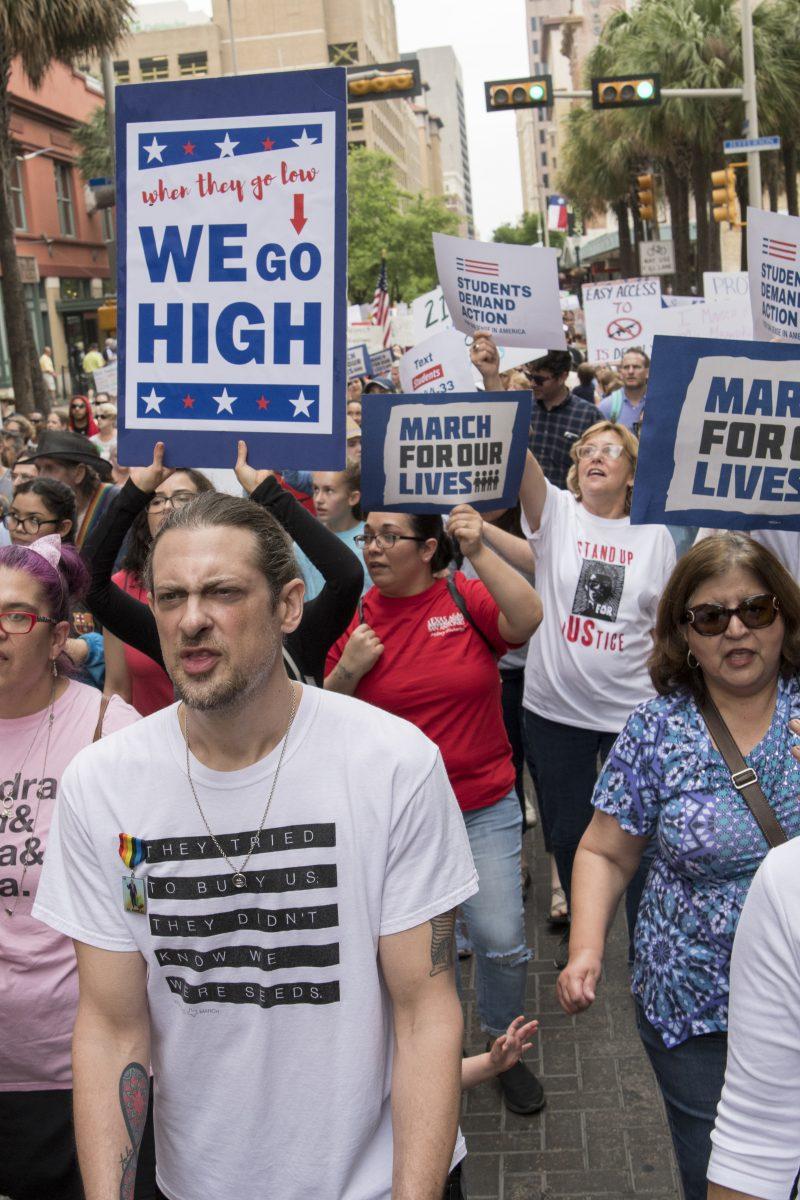On Saturday, March 24, I participated in March For Our Lives along with members of Trinity Progressives and other members of the Trinity community. MFOL was pioneered by Parkland students activists such as Emma Gonzalez and David Hogg to protest gun violence and commemorate the 17 victims of the Parkland shooting.
Overall, the march was a positive experience. San Antonio citizens came together, holding signs with slogans like “Books Not Bullets” and “Make America Safe Again.” Some people were creative: I saw a woman wearing a sombrero covered with Barbies, each doll holding signs with phrases like “never again.” The most resonant moment was at the march’s end at the Alamo. Students participated in a “die-in” — we laid down for 17 minutes to remember the shooting’s 17 victims as a speaker relayed US gun violence statistics.
I agree that the U.S. needs to implement gun reform to stop mass shootings, and it’s encouraging to see young people engaging in activism. Millennials have never had more than a 50% voting rate — and the jury’s still out on “Generation Z” — but I’ve seen my generation become more engaged over the past few years. That’s a good thing.
However, support of gun reform and Parkland student activists doesn’t mean that we shouldn’t critique their official manifesto, published in the Guardian one day before the march. Our country needs to make changes to prevent school shootings, but some of the manifesto’s solutions could harm students instead of helping them, especially students with mental illnesses and disabilities, and students of color.
One of the changes proposed in the manifesto is to “change privacy laws to allow mental healthcare providers to communicate with law enforcement.” According to the Guardian piece, if police had known that Nikolas Cruz, the shooter, was “disturbed,” they could have stopped him from harming others.
This idea, like a lot of discussions surrounding gun reform, identifies serious mental illness as the force that drives people to harm others. This is rarely the case. According to the book “Gun Violence and Mental Illness” published by the American Psychiatric Association in 2016, mass shootings by people with serious mental illness represent 1 percent of all gun homicides each year. Most people with mental health problems are not violent or scary — they’re just regular people, doing their best. Studies show that people with mental illnesses or mental disabilities are more likely to be harmed or abused by others around them — even guardians or caretakers — than to harm others themselves.
In the case of violent offenders like Cruz, we should talk about how masculinity and white supremacy encourage radicalism. Cruz may have been mentally ill, but he also espoused racist, homophobic and anti-Semitic views in an Instagram group chat. Instead of blaming poor mental health, we can analyze bigoted views that often motivate mass shooters to harm others.
Mental health professionals are already required by law to alert police if a person is suicidal or homicidal. A further “change in privacy” could breach clients’ rights with the unwanted consequence of making people more reluctant to go to therapy. People with stigmatized mental illnesses like bipolar disorder and schizophrenia often face danger from police, particularly if they are people of color. We want it to be easier for people to get help, but this proposal could make it more difficult.
Another proposal is that “schools should be given sufficient funds for school security and resource officers to protect and secure the entire campus.” Research shows that police in schools lead to higher rates of suspensions, expulsions and arrests, particularly in schools with a majority of students of color. Adding police can accelerate the school-to-prison pipeline by sending children into the criminal justice system based on unconscious biases. Black students from Marjory Douglas High School like Kai Koerber and Tyah Amoh-Roberts have already expressed discomfort with this plan, and their voices deserve to be heard along with those of their peers.
Gun violence is a problem, but militarizing schools and the psychiatric system isn’t the answer. Instead, we need to enact common-sense gun reforms while also changing our culture that tolerates violence. We can’t solve the problem before addressing its roots.
The students shaping this policy are young and well-intentioned, and they will become more socially aware in the future. This doesn’t mean that their ideas are exempt from critique, or that we shouldn’t discuss how their policies are influenced by the adults around them. The good news is that we’re all finally talking about these issues, and discussion is the first step towards change and a safer world.







Francesca Barrera • May 12, 2020 at 9:46 am
Over 2 years later, 5/2020 where do laws/policies stand at the moment and what is the movement going forward to decreasing and or eliminating gun violence to further protect the children/students in all schools and colleges in the country?